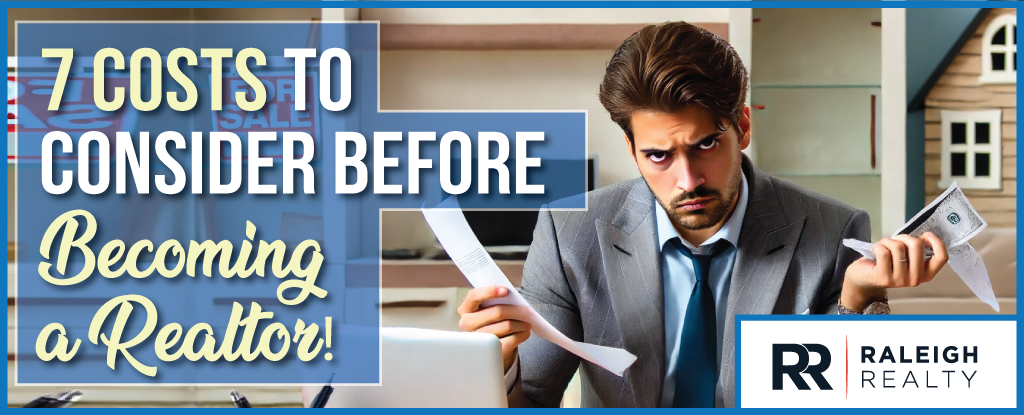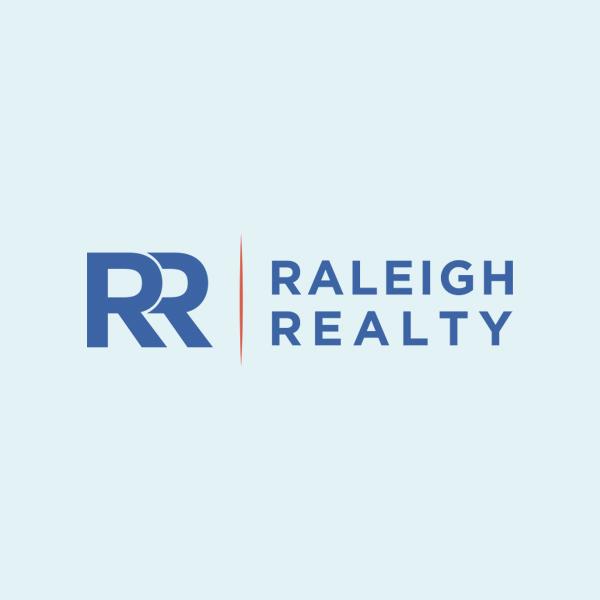The True Cost of Becoming a Realtor
Are you thinking about starting your career in real estate? Here are seven essential expenses to budget for as a realtor.
Becoming a real estate agent and getting your real estate license is the first step in pursuing a rewarding, exciting, and profitable real estate career. As a Realtor, you must think about your real estate career as a business, meaning you will be responsible for budgeting, expenses, startup costs, and marketing and administrative expenses that come with starting a business.
The real estate industry offers incredible opportunities for growth, flexibility, and financial success. However, becoming a realtor requires an upfront investment like any professional career.
If you want to sell homes in Raleigh, understanding these costs beforehand can help you plan your budget and set realistic expectations for your real estate journey.
Many first-year Realtors don't realize just how expensive it is to be a Realtor or what the day in the life of a Realtor consists of, and that's why it's a good idea to prepare before you decide to move forward.
Here's a comprehensive breakdown of the seven essential costs you'll need to consider when becoming a realtor in North Carolina.
1. Pre-licensing Real Estate Education Course
Approximate cost: $200 to $800
Before you can take the state exam, North Carolina requires completion of a 75-hour pre-licensing education course. This foundational course covers essential topics including real estate law, property management, financing, and ethics.
You have several options for completing this requirement:
- Online courses: Typically range from $200-$500 and offer maximum flexibility
- In-person classroom instruction: Generally cost $150-$300 depending on the school
- Hybrid programs: Combine online and in-person elements, usually priced in the middle range
All prospective real estate agents must complete a pre-licensing course designed to help them understand the terminology and concepts in the real estate industry.
For example, before beginning your pre-licensing course, you may not understand the difference between 'Tenancy in Common' vs. 'Joint Tenancy' or know how to calculate acreage, but you will have a strong grasp on these concepts after completing the course.
The cost of the pre-licensing course will vary considerably from state to state. Some states offer the pre-licensing class online, and it may only cost $100 or $150, whereas other states do not allow online pre-licensing courses and will require all prospective real estate agents to take a live class.
While the class will provide appropriate study materials, any additional materials you purchase to help you learn including flashcards, textbooks, and real estate guides will come at an additional cost.
Research different schools thoroughly. Read reviews, compare curriculum, and consider the pass rates of their students. The cheapest option isn't always the best value if it doesn't adequately prepare you for the exam.

2. Real Estate Exam and Licensing Fees
Approximate cost: $205+
Once you've completed your pre-licensing education, you'll need to take the North Carolina real estate broker exam and obtain your license.
This involves several fees:
- State examination fee: $60 for both the state and national portions of the exam
- License application fee: $100 non-refundable application fee
- Background check fee: $45 fee for the criminal history record report
If you need to retake a portion of the exam, the fee is $50, so it's worth investing in thorough preparation to pass on your first attempt.
While North Carolina does not charge for the real estate license, some states may charge around $150.
In North Carolina and many other states, you will be responsible for renewing your real estate license yearly. Some states may only require you to renew your real estate license every two or three years. In North Carolina, it costs $45 to renew your real estate license.
3. Real Estate Brokerage Fees
Approximate cost: $0 to $500+/month
After obtaining your real estate license, you must join a local brokerage that will hold your license. You might also be responsible for paying a desk fee if you choose to have a designated desk area in the brokerage office. If you choose not to have a desk, this fee will not apply.
In addition to paying a desk fee, you will also be responsible for paying brokerage fees. Brokerage fees are typically deducted from your commission split and cover administrative and marketing-related costs such as office supplies, social media advertising, signage, and brochures.
Different brokerages have varying fee structures:
- Traditional brokerages: May charge desk fees ranging from $200-$500 monthly, plus transaction fees
- Commission-split brokerages: Take a percentage of your commission (typically 30-50% for new agents) with lower or no monthly fees
- 100% commission brokerages: Charge higher monthly fees ($300-$500+) but let you keep more of your commission
- Teams: May have unique fee structures combining elements of the above
While fees are important, also evaluate the training, support, lead generation, and mentorship each brokerage offers. A higher-cost brokerage might provide better value if it helps you close more deals.
.png)
4. Real Estate Membership Dues and MLS Subscription Fees
Approximate cost: $156+/year
After becoming a Realtor, it is advised to join the National Association of REALTORS®, which provides resources to help real estate agents maximize their earning potential and strengthen their professional skills.
It comprises commercial and residential brokers, property managers, salespeople, appraisers, and many others in the real estate industry. Membership costs $156 per year.
Of course, this membership is entirely up to you and not all real estate agents become members of the National Association of REALTORS®.
If you choose not to become a member, you may want to join your state and local real estate boards, which have fees associated with them. State association fees typically cost several hundred dollars per year. If you are a local real estate board member, you may pay the fee directly to your broker.
To access to the MLS database, an MLS subscription generally costs between $20 and $50 a month.
5. Realtor Marketing Expenses
Approximate cost: $1,000+/year (variable)
Marketing costs are typically among the highest expenses a real estate agent will pay yearly. This will be particularly applicable as a new agent because you will want to spend considerable time marketing yourself and spreading the word about your real estate services.
in North Carolina, most agents allocate around 10% of their gross commission income to marketing and advertising. However, this percentage may vary depending on if you are a new or seasoned agent.
Your marketing budget might include:
Essential Marketing Tools:
- Professional headshots: $200-$500
- Business cards and printed materials: $300-$500 annually
- Professional website: $500-$2,000 setup, plus $50-$200 monthly maintenance
- CRM software: $30-$100 monthly
- Social media management tools: $20-$100 monthly
Some real estate brokerages may provide a marketing budget to help new agents grow their business. Before joining a brokerage, it is advised to discuss marketing-related expenses and learn what level of support the brokerage offers regarding advertising and promotion.
6. Business-Related Expenses
Approximate cost: $1,000 to $5,000+/month (variable)
Administrative and miscellaneous costs play an important role in strengthening your business. These may include office supplies, a new computer or printer (if working from home), cell phone and internet bills, etc.
In addition to administrative costs, you may also spend money on gifts, lunches, and client meetings while working with them. These costs may vary but it is important to budget for them.

7. Real Estate Continuing Education Courses
Estimated cost: $50 to $400+/year
You must maintain your real estate license by taking continuing education courses required by your state. Although these can be costly, it is essential to complete the required coursework to avoid losing your license.
Those who fail to complete the continuing education coursework on time may need to pay additional fees or lose their real estate license. If that happens, you cannot get paid on any deals until you re-take the full real estate licensing course and pass the exam(s).
North Carolina requires licensed brokers to complete continuing education to maintain their license:
- 8 hours of continuing education annually: Courses typically cost $50-$200 each
- Specialized certifications: Additional designations like GRI, CRS, or ABR can cost $200-$1,000 each but may increase your earning potential
- Professional development: Industry conferences, workshops, and training seminars range from $100-$500 per event
Although some may see continuing education as a burden, it is a helpful way to stay informed about new real estate trends, terms, and resources and will help you be an even stronger resource to your clients.
Methodology
Data was sourced from the North Carolina Real Estate Commission and the National Association of Realtors to determine the true cost of becoming a Realtor.
FAQs
What do Realtors do?
As a Realtor, you will be responsible for finding buyers and sellers and guiding them through the transaction process. Finding new clients involves attending networking events, participating in local events in your community, marketing yourself on social media, and staying in close contact with friends or family members who may be interested in buying or selling a home in the future.
It involves diligence and persistence, as many prospective clients may take months or even year until they are ready to buy or sell a home. In addition to obtaining clients, it is also important that you stay ahead of the real estate market and inform your clients about any noticeable trends or projected changes.
This involves researching recent homes that have closed in various neighborhoods, understanding the rental market, and staying updated on mortgage-related information.
If you obtain a buyer client, you will be responsible for meeting with them to discuss what they are looking for in a home. You will then research where they wish to move, find homes that meet their criteria, and schedule appointments for them to view the homes.
While some buyers may find the home of their dreams the first time they go out to look at houses for sale, this isn't quite as common. Your buyer may take several weeks to find the home they want.
After finding the home they wish to purchase, you will handle all aspects of the transaction process, negotiate a lower price for them if necessary, and help them save as much money as possible.
If you are working with a seller, you will assist them in staging their home to sell, which may involve guiding where to position furniture and other items in the home to make the space appear as appealing as possible.
After listing the home, you will hold open houses frequently until you find a buyer. In addition to hosting open houses, you will also be responsible for marketing the property through digital advertising, mailers, and other marketing methods.
When you successfully find a buyer, you will then work with the buyer's agent to complete the transaction. This involves helping to negotiate the price and various other costs the seller may be responsible for, such as repairs on the home, etc. Ultimately, your job is to ensure your seller gets the highest price possible for their home. This is how to be a successful Real Estate Agent.

How much do Realtors make?
According to the U.S. Bureau of Labor Statistics, the median annual salary for real estate agents totaled $56,320 (as of May 2024). Real estate agents are paid a commission, earning a percentage of the property's closing price.
How hard is it to become a Realtor?
The barrier to entry is not difficult when it comes to real estate. As long as you are over 18 and are a U.S. citizen, you can take the necessary pre-licensing courses to obtain your real estate license. A college degree is unnecessary; some states do not require a high school diploma either.
Obtaining a real estate license involves taking the pre-licensing course, studying the applicable materials, and passing the exam. Although obtaining a license is not difficult, being a successful real estate agent can pose more of a challenge.

What does it take to become a Realtor?
Many agents quit real estate prematurely because they expect to see huge profits early in their careers. Television shows such as Million Dollar Listing can often make real estate appear a breeze, as they love focusing on millionaire agents.
It is important to remember that even the most successful real estate agents in the world had to start at the same place you did: passing the real estate exam and studying the industry.
Those who stick with it and put dedicated time and energy into learning all they can about real estate, diligently follow up with prospective buyers and sellers (without being overly aggressive), and take the time to genuinely get to know every person they work with will have a greater chance of being successful.
Costs to Consider Before Becoming a Realtor - Final Thoughts
Becoming a Realtor is not just about the upfront costs. It is an investment in a career that can provide flexibility, growth, and financial success for years to come. With proper planning and the right support system, these initial expenses become the foundation for a thriving real estate business.




